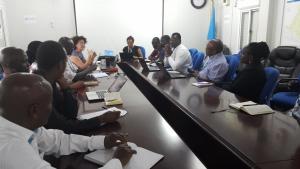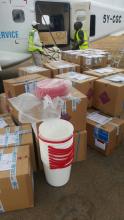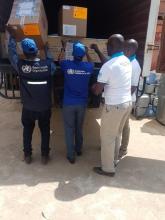WHO and the health cluster support the response to the suspected food poisoning in Bor South County in South Sudan
Juba, 19 February 2018 – Following an alert of suspected food poisoning on 18 February 2018, where one community death and an influx of over 400 patients were admitted at Bor State Hospital, and several others in private facilities within Bor town, WHO and the health cluster quickly mounted a response to support the Ministry of Health to treat those who were admitted.
Patients presented mainly with diarrhea, vomiting, fever, general body weakness and headache after attending and eating food at a building inaugural ceremony. Many patients are admitted in Bor Hospital for treatment and are being given fluids, antibiotics and other supportive treatment. Due to huge number of patients admitted over a span of three hours, Bor State Hospital was overwhelmed and had run out of essential supplies like fluids (Ringers Lactate) and antibiotics.
As part of the immediate response, Health Link South Sudan in Bor delivered 300 liters of Ringers Lactate and gloves. The needed supplies were delivered to the facilities on Sunday at around mid-night with logistical and security support from WHO, OCHA and the Quick Response Force (QRF) of UNMISS.
To mitigate the shortage of supplies due to the magnitude of the patients, WHO and Health Cluster at national level chartered a flight and delivered 1.5 tons of infusion kits, antibiotics, infection prevention and control and sample collection materials including dispensary tent, chlorination kits for disinfection and water treatment kits from Juba on 19 February 2018. The supplies reached the facilities within 8 hours of notification of the event.
To improve the quality and speed of the response WHO deployed five technical staff to support the health partners in Bor and the State Ministry of Health. The team are providing 24-hour triage and clinical care, infection prevention and control, risk communication as well as surveillance and investigation for the source of the transmission and associated risk factors.
Thanks to South Sudan Humanitarian Fund, United States Aid for International Development and European Union Humanitarian Aid (ECHO), WHO and health cluster partners were able to swiftly respond to the event. WHO will continue to monitor the situation and provide additional support as required including sending samples to international reference laboratories for further testing, Mr Evans Liyosi WHO Representative a.i. for South Sudan underscored.
Tel : +211922135555 or +211916097828
Email: ramadano [at] who.int (ramadano[at]who[dot]int)
Tel: +211 955 036 448
Email: armahm [at] who.int (armahm[at]who[dot]int)





